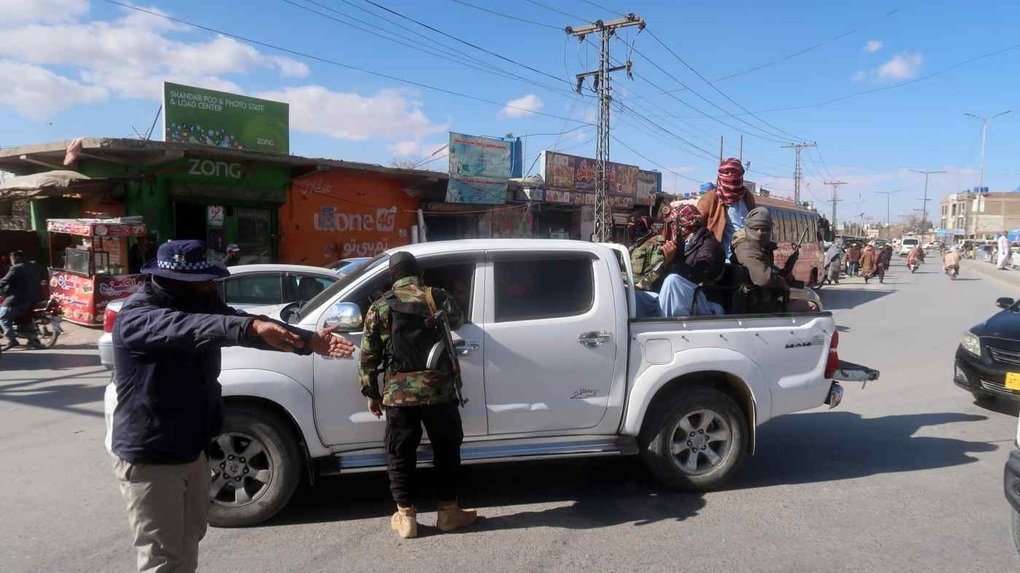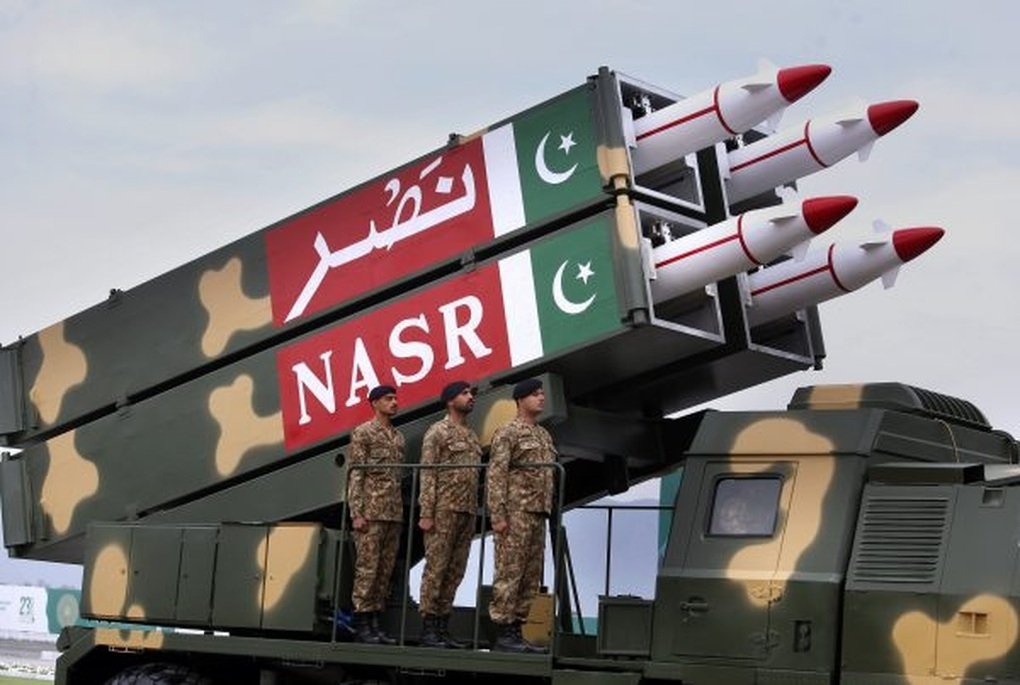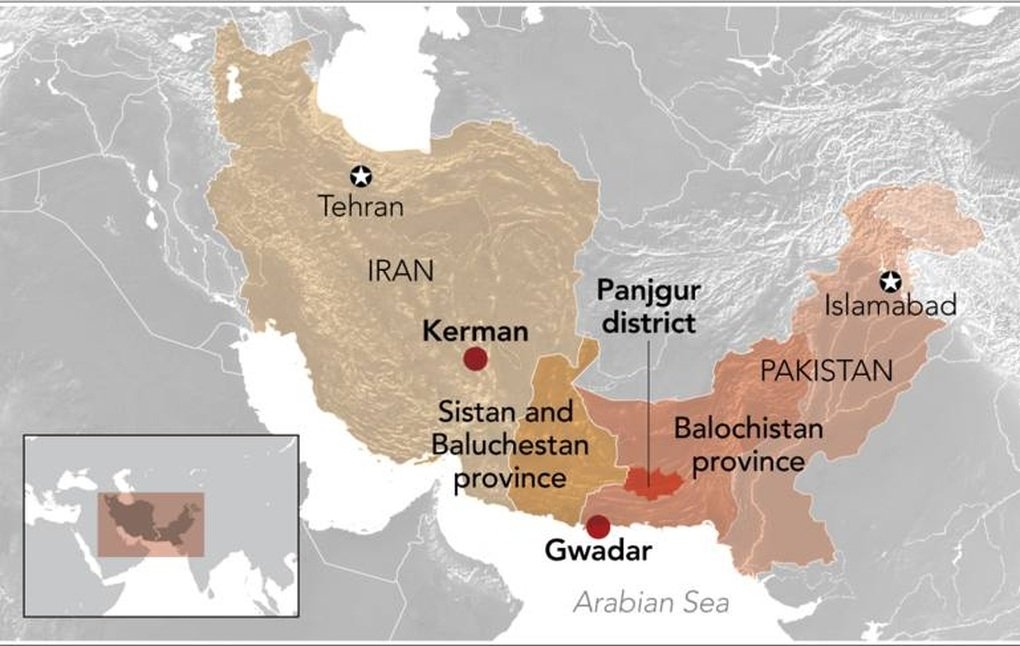(Dan Tri) – Observers believe that it is unusual for two neighboring countries, Pakistan and Iran, to attack each other’s territory in a `tit for tat` fashion when both sides have common enemies in the border area.
Pakistan and Iran have both carried out attacks on each other’s territory, leading to an unprecedented escalation of tensions between the two neighboring countries, in the context of the Middle East `pan of fire` heating up.
The two countries share a volatile border, stretching about 900km, with Pakistan’s Balochistan province on one side and Iran’s Sistan and Baluchestan provinces on the other.
Both countries have long battled rebels in the Baloch region along their shared border.
`An eye for an eye` attack
The border area between Iran and Pakistan has had mutual attacks (Graphic: Nikkei).
On January 16, Iran launched an attack in Pakistan’s Balochistan province, killing two children and injuring several others, according to accusations from Islamabad.
Tehran claimed it was `only targeting Iranian terrorists on Pakistani soil` and that no Pakistani citizens were targeted.
Islamabad criticized Tehran, calling the attack a `serious violation of international law and the spirit of bilateral relations between Pakistan and Iran`.
Iranian news agency Tasnim said Tehran attacked strongholds of the Sunni Muslim armed group Jaish al-Adl.
This group operates on both sides of the Iran-Pakistan border and has claimed responsibility for attacking Iranian targets.
Pakistan – which possesses nuclear weapons – has a majority Sunni Muslim population, while Iran and the `Axis of Resistance` parties are largely Shia Muslims.
Two days after Tehran’s attack, Pakistan on January 18 confirmed that it had `specifically targeted and closely coordinated precision raids` on a number of alleged hideouts of separatist forces in
Pakistan’s Foreign Ministry said several members of the separatist forces were killed.
Pakistan has said for many years that its separatist forces have had a `safe haven` in Iran.
The Baloch people live in the intersection area between Pakistan, Afghanistan and Iran.
The area they live in is also rich in natural resources, but Baloch separatists say they do not benefit from these.
Balochistan, Pakistan’s largest province, has seen a series of deadly attacks in recent years, fueled by a decades-long separatist insurgency.
Iran has also faced a series of uprisings from Kurdish, Arab and Baloch minorities.
Jaish al-Adl is just one of many separatist groups operating in Iran.
Calculation of the parties

Pakistani security forces patrol in Quetta, capital of Balochistan province after Iranian attacks (Photo: EPA).
The war against separatists by Pakistan and Iran has been going on for many years on the border of the two countries and is not new.
However, what is most surprising is that both sides are willing to attack the other’s territory without notifying each other in advance.
In addition, Ejaz Haider, a political analyst in Pakistan, said Iran’s attack was truly surprising, given the current situation in the Middle East.
`When the fighting in Gaza has not cooled down and Hezbollah and Houthis – both Iranian proxy forces in the Middle East – are confronting Israel and the West, it is unreasonable for Tehran to open a front in the east with Pakistan.
However, experts believe that Tehran’s air strikes on Pakistan may be part of a series of retaliation after the ISIS-K attack on January 3 that killed 90 Iranians.
Before attacking the target in Pakistan, Iran raided what it claimed was a spy base for Israel’s Mossad intelligence agency in northern Iraq and on `anti-Iran terrorist groups` in Syria.
Fakhar Kakakhel, a security analyst, suggested that there could be operational cooperation between ISIS-K and Jaish al-Adl, as both groups share an anti-Iranian ideology.
`Jaish al-Adl may have created conditions for an ISIS-K element to enter Iran to carry out a suicide bombing,` he said.
The air strikes could also be a signal for Pakistan to act more decisively to control militant groups in its territory.
`Iran’s message to Pakistan’s military is clear: deal with the threat within your borders, or we’ll do it ourselves,` said Adam Weinstein, deputy director of the Quincy Institute’s Middle East program.
Pakistan has responded.
According to Al Jazeera, the January 18 raid was the first missile attack targeting Iranian territory since the 1988 Iran-Iraq War ended.
Pakistan’s retaliation seems to reflect pressure from Islamabad in its efforts to prevent security threats as the election approaches.
Mr. Weinstein said: `These Iranian attacks show that Pakistan is facing great pressure. They are in a long-standing state of tension on the border with India. They also have a volatile border with Afghanistan and now
What will happen next?

Pakistani missiles (Photo: The Diplomat).
Iran’s attacks on January 16 sparked a diplomatic confrontation, with Pakistan recalling its ambassador to Iran and suspending all high-level visits from its neighbor.
And after Pakistan’s attack, Iran today asked its neighbor for an `immediate explanation`, Tasmin reported.
Neighboring countries have spoken out, with India saying it has `zero tolerance for terrorism` and that the attack was `a matter between Iran and Pakistan`.
On January 17, US State Department spokesman Matt Miller said Washington was trying to prevent the Middle East from breaking out into a full-blown conflict.
`We have seen Iran violate the sovereign borders of three neighboring countries in just the past few days,` he said, referring to Pakistan, Iraq and Syria.
Pakistan’s attack today on Iranian territory shows that Islamabad has decided to respond to Tehran not only with diplomatic moves.
However, messages from Iran and Pakistan show that the two countries do not seem to want the situation to escalate out of control.
Pakistan’s Foreign Ministry called Iran a `brotherly country` and emphasized the need to `find common solutions`.
Representatives of both countries declared their respect for the other side’s sovereignty and territory.
